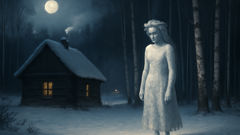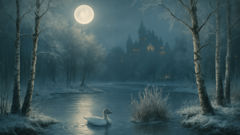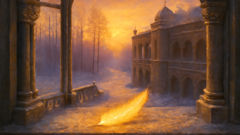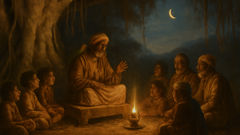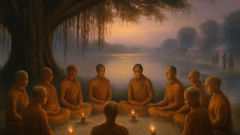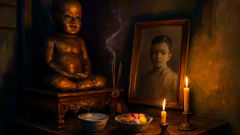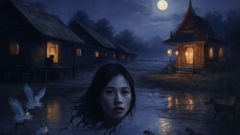Introduction
In the far reaches of winter, where the birches whisper and the rivers sleep beneath glass, there was once a village that took its days by the measured rhythm of frost. Smoke rose like pale fingers from thatched roofs, and the road to the wood was a ribbon of stamped snow, the only sound a steady scrape of sled runners. It was in such a place, where the winter seemed to hold its breath for months at a time, that a childless couple—an old woodcutter and his wife—longed for what they could not have: laughter to fill their small hut and feet to run upon their frozen yard. One night, when the moon sat thin over the birch crowns and the stars were sharp as icicles, the old woman made a child of her longing. She packed snow, feathered with fern and hair of frost, and from it formed a little girl, perfect as a pressed blossom. She set into the hollow of the snow a face like milky glass, eyes of polished jet, and braided a wreath of thin birch twigs around her head. The old couple took to calling her Snegurochka—Snow Maiden—and she moved among them as if she had always been part of their hearth. But the wind had not fashioned her with a human heart; it gave her instead a brittle curiosity. She laughed like bells when she watched children, she learned the cadence of the village songs, and she sat by the stove to watch the steam of porridge rise. Her skin held the glint of new-fallen snow; her breath, when she spoke, misted into tiny filigree. Though she watched love closely—its quarrels and its kindness—Snegurochka did not know warmth. She would touch the cheek of the old man as he returned from the forest, and the contact would send a silver mote from her like a flurry. She would follow the boys to the river and feel the pang of wanting as they carved hearts into ice. The villagers taught her names and ways, and, in return, she made winters less lonely, her presence like the hush that settles after the first snow. Yet beyond the pleasantness of being seen and admired, a deeper hunger grew inside her—a longing for the small, mortal things that made being alive both painful and beautiful: a son's claim upon her skirt, a lover's hand that would not care if she were snow. That hunger was a dangerous flame in a creature who could not keep a single sunlit minute. Stories in that region never shy from the cost of impossible desires: they would say the seasons do not forgive the crossing of their borders. To love as a human requires warmth, and warmth is the thing that consumes the Snow Maiden most cruelly.
The Making and Early Days of the Snow Maiden
The old woodcutter and his wife had tended the birches and coaxed meager crops from a thin soil for longer than anyone could recall. Their hands were gnarled like the roots they dug, faces grooved by sun and cold. They had wanted a child for company and for the echo of younger footsteps in their yard. In a time when people still listened to the counsel of elders who read omens in frost patterns, the old woman had been told that if she wanted a child and had no seed, she could fashion a form from what the land gave freely. So she did. Under a cupola of stars, when the sky tasted of iron and the snow lay quiet as a closed book, she shaped a little figure. She pressed bundles of hay into the hollow of snow to give the body a shape that would not crumble at the first warmth from a stove. Into the face she set stones that gleamed like pupils and then, as if by prayer and habit, she breathed a wish upon the child: a wish so honest it tasted of the heart. They named her Snegurochka and brought her to the fire, and the village thought it a miracle: a child, at last. But miracles in the old tales are rarely without cost. The Snow Maiden could laugh like a wind-chime when children danced, yet she did not blush when shy glances passed. She learned the names of herbs and the songs of market women and could mimic the cadence of a lullaby until the old woman's heart ached with pleasure. At festivals she would glide across the square, her white skirt flaring like frost caught at the edge of the world. Men and women admired her for the novelty of such a being—some with a tenderness that mistook her for human, others with a curiosity that skirted on fear. A troupe of young men, emboldened by vodka and winter light, once sought to play at courting her, to see if the frost could hold to a garment of gossip and song. She tolerated their teasing with a patient brightness but did not feel the small rebellions of pride or anger that ignite among mortals. Where human hearts kept a pulse of anxieties and jealousies, she maintained a stillness that made some villagers suspicious. They would say, behind knitted brows, that things made by hand and wish are under an old law: they belong to the season that birthed them. Meanwhile, for Snegurochka herself, the world was a map of mysteries. She marveled at a child's first fall from a sled and the sudden cry that always turned into laughter; she learned to watch a mother tuck a baby under a fur blanket, and the way the mother's thumb rubbed the child's temple until sleep took it. Each sight was a lesson in a life she could never fully taste. She collected gestures like other children collect conkers—small currency that indicated belonging. A farmer's wife taught her to mend shirts; a little boy showed her how to make a paper boat and launch it in a frozen puddle. The Snow Maiden kept these tokens with an earnest hunger. When spring's rumor reached even that far north—when mud began to show like a bruised cheek and the sparrows returned to argue in the eaves—Snegurochka would stand at the door and feel a confusion she did not have words for. She saw heat in the way a new mother pressed her baby to a bare chest; she noticed the redness of cheeks not from cold but from the blush of love. The villagers, for all their kindness, kept to their rhythms; they loved her, they taught her, and some warned her, in low and old voices, that those who cross from one season to another do not always keep both gifts. But the Snow Maiden did not heed the warnings in the same way a human child might. She measured the world by immediacies: the glide of a fox across a silvered clearing, the salt of preserved herring that she tasted once, the cadence of a lullaby that fell like rain in a parlor. Her very stillness made some men want to protect her, others to claim her novelty as a right. And then there were those among the villagers who felt something more like pity than affection: widowers with careful hands, young lovers testing their courage, and a blacksmith's son whose chest tightened when she passed. The blacksmith's son, named Ivan by common speech, was not unlike other boys—tall, quick-handed, full of the stray tenderness of young men who had known winter as a teacher. He watched the Snow Maiden with an attention that brought color to conversations; when he laughed his eyes crinkled and when he was silent, he would stand too long by the birch fence. He courted all that was earthly: horses, crafts, meals shared under the eaves. When he approached Snegurochka, his gesture was at once clumsy and sincere. He did not seek to strike bargains with old wives' tales; he wanted to know if something like love could look back at him from the frost. In those years people still believed in the meeting of hearts as a thing both fragile and binding. Ivan's visits to the hut were shy at first. He brought a wooden toy for the Snow Maiden, carved with a hand that bore a blacksmith's confidence. She took it with wonder, pressing the wood to her ear as if it had a pulse. They spent afternoons by the stove, listening to the old woman stitch and hum. The villagers noticed the change as one notices weather shifting—small at first, then certain. Some applauded the possibility that love might be the answer to a restless maker's prayer. Others whispered their misgivings. The old woman had stitched a scarf from coarse wool and folded it into the Snow Maiden's lap, yet Snegurochka would never wrap it properly; scarves were warmth, and warmth was an experiment she feared to understand. Even as she learned the textures of human touch, the laws of seasons held their strict ledger—what spring gives, winter may take. The tale of the Snow Maiden's early days became a small legend of the parish, told at long evenings when children clustered to hear how the snow could make a companion and how, perhaps, a companion could be warmer than the fire.
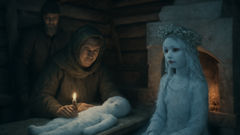
Yearning, Human Love, and the Cost of Warmth
Seasons taught the villagers patience. They measured the world by the lamplight that grew earlier each night and by the slow procession of feasts: Sretenie, Maslenitsa, and the hush of winter prayers. The Snow Maiden grew among these markers, learning not only songs but the deeper grammar of human gatherings: the way people forgive and forget small slights, the way they press grief into neat bundles and tuck them into the corners of their speech. Yet inside her was a hunger that began to shape a particular kind of courage. She wanted more than to be admired for her strange beauty or protected for her fragility; she wanted to be touched in a way that would make the bells of the village sound clearer. When Ivan's hand first found hers—awkward, calloused, apologetic—she felt something like a crack of light inside the glass of her ribs. It was a small, sharp curiosity that lodged like a seed. He liked to bring her small things: a reed whistle, a carved horse, sometimes a fresh-turned apple when merchants came in from the road. He told her stories of smithy-work and horses and the way fire bites and tames. As his visits became busier, the villagers' talk turned toward marriage, a thought that sat ill at ease among those who remembered the old law: some things made by winter are not meant to live where summer rules. But love will not always be governed by law or logic. Ivan's ardor was a wordless insistence; he would stand under the birches at dusk, waiting for a glimpse of her silhouette against the lowering sky. One golden morning when the thrushes returned and the first mud showed at the stream, Ivan spoke plainly: he would ask for Snegurochka's hand just as one asks for any hand that will accept the shorn life of village labors. The Snow Maiden listened, a light like frost crawling along the inside of her chest. She wanted, desperately, to say yes. The old woman, who birthed her from longing, felt the sting of the decision: to let go would be to risk everything she had shaped with her own hands. The village gathered in halting solemnity—an ordinary wedding in the register of the church seemed impossible, so they worked around the edges: a blessing by the birch, a circle of songs, the gift of bread. For a week the air felt altered, as if the world was testing the seams of a new arrangement. The Snow Maiden attempted to learn the rituals of a bride—she walked in a small procession, accepted a wreath of woven straw, and attempted to drink a cup offered to her. There is a peculiar cruelty in ritual to a being not made for heat: a cup that warms in human palms frightens a creature of frost. She feared what she could not name. On the day Ivan knelt, the sun came pale and cautious, a thing that does not rush into winter's domain. As he took her hand, their fingers touched and she felt a sensation she had never before sustained: an immersion of warmth like the first seep of thaw into earth. Time, which in the village is usually measured by the steady grinding of seasons, seemed to hang like a breath. The Snow Maiden's eyes widened; the world sharpened into contradictory delights—colors more vivid than before, the smell of lard and smoke and pine resin rising from a hundred small sources. Love, she discovered, was not an abstract bloom but a weight and a fire. It was delightful and terrifying. The villagers cheered with all the well-meaning noise a winter parish could muster. Children threw little wreaths that tinkled as they fell. The blacksmith hammered a small iron token to hang from the couple's door. But where there is warmth to be welcomed there is also the risk of consumption. The more Snegurochka let warmth inside, the more she betrayed the laws that had birthed her. She had been made by a hand that worked with frost; to accept heat was to accept unmaking. People had told her in murmurs that love might melt her, that the crossing from frost to living blood was an impossible bargain. But words in the wings are thin defenders against the force of touching someone who chooses you. Ivan's hands were steady and honest; his kisses were like the press of hammered metal—sure, urgent, human. When she leaned into his chest, she felt for a moment as if she might root, as if a new sort of life had been offered to her not by craft but by gift. Then, inevitably, the first trace of loss appeared. On an evening when the moon hung low and grey as old tin, she stood with Ivan at the threshold of the yard. The children had gone home, and the last lantern had guttered. He took her in his arms, and for the first time she felt a heat so close that it made her think of the stories of green grass and warm skin; it made her remember the certain pull in the chest she had only ever observed in others. The Snow Maiden's breath became a fog, and from the bend of her shoulder a single drop fell like a small, honest jewel. The old woman watched, hand to mouth, as the drop melted into the packed snow. Panic, swift as a hawk, passed among those who understood what the drop signified. Folk memory is long and holds a calculus for these things: every grain of warmth gained by a child of frost had a scale of loss to match. Snegurochka's melting did not happen all at once; it was not a neat, plaintive rhyme where the world goes black and the curtain falls. Instead, it was a gradual yielding—a leaking of the self that left her lighter and more translucent. Her laugh slowed into a thin sound; her steps became less sure. The villagers tried remedies: they fanned cold air upon her with birch branches, they wrapped her in thick wool, they carried her to the river at night and dipped her feet where ice still held. But the law of seasons is not easily thwarted. In private, Ivan wept with a rawness that the smith's bellows could not temper. He covered her with his coat and begged for time, for some reprieve the world might not grant. The Snow Maiden, for all her nascent desire to stay, felt herself becoming something other—an echo of what she had been. She had felt human love and in the feeling discovered that it asks for exchange: bodies press for warmth and risk. In the end, on a morning when a weak sun tried to lend winter a mercy, Snegurochka stepped into the square and stood as if to take one last look at the village that had raised her with gentle astonishment. Children crowded, wondering why her cheeks were gone and why her fingers left tiny beads of water where they brushed the fence. She turned to Ivan and reached for him, not with the clumsy mimicry of earlier days but with a sacred, terrifying acceptance. When they touched, she melted like glass before flame—slowly, with a sound like a small bell. The village remembered the precise softness of the moment: the way the snow at her feet steamed when the air kissed it; the way a white scarf slipped from her shoulders and clung to the fence like a memory. By afternoon, only a shape, a wet stain on the packed square, and a wreath of birch twigs remained. Ivan pressed his forehead against the doorpost until the wood darkened with his tears. The old woman folded her hands and, in her silence, kept the story like a brittle coin. Later, travelers who passed the village would be told with a gravity reserved for warnings: do not mistake the miracle of snow for the steadiness of flesh. The Snow Maiden had come from longing and had been undone by wanting that same longing to be returned in the way human hearts require. Her fate was told as both lament and lesson: an offering to the truth that some borders between seasons are not to be crossed, even by love.
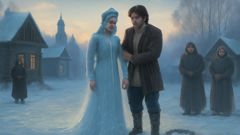
Conclusion
The tale of Snegurochka does not end with a tidy moral but with a memory that lives in the hush between seasons. Villagers would light candles for years, not to call her back but to honor that which had been both created and lost. Mothers told the story to their children at plaiting-time and at baptisms, not to frighten them but to teach a certain tenderness toward the strange and a respect for the edges that separate one world from another. In some tellings, the Snow Maiden returns as a wind that shakes the birches or as a white blossom in a new spring, and in others she remains a caution at the heart of winter. The truth in the old songs recognizes that love is both glorious and dangerous: it warms, but it also consumes. Snegurochka's brief brush with human life made those who loved her more careful with the living—more mindful that gifts of the heart require protection and that some desires are best admired from a distance. Yet her story also binds people across generations: it is sung at sleigh rides and in the quiet of late afternoons when the light is thin. In remembering her, the villagers kept alive an understanding that the world is stitched from many fabrics—some of which cannot be sewn together without loss. The Snow Maiden's legacy is not a lesson of denying love, but a recognition of the cost when the language of seasons is misunderstood. She is, forever, the pale testimony that longing can be both an origin and an end, and that compassion must be measured by the harm it may unknowingly cause. Even now, when the first snow falls and children press palms to cold windows, someone will whisper her name—Snegurochka—and the sound will be part sorrow, part reverence, and part the quiet acknowledgment of how beautiful and terrible it is to desire.

